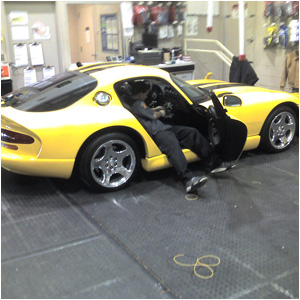Mike Carvalho
By Frankie Barnhill
Mike Carvalho always knew he would attend Montgomery College, so he never bothered applying anywhere else. What the 20-year-old didn't know is that he would drop out of MC two years after he started.
"I'm taking a quick break [from college] because I have a baby on the way," Mike says, sitting at his parents' kitchen table. "I'm just trying to get some extra money in before the baby arrives."
Mike's girlfriend Zoe Torres is 18 and in her senior year of high school. Their baby girl is due in January, and the couple has already picked out her name: Scarlett.
"I'm excited, I can't wait," he says. "I would just rather these months go by a lot quicker, and [the baby be born sooner]!"
Mike says he'll go back to school, but in many ways the odds are against him.
Among Latino students who graduate from high school, about 80 percent eventually go on to college. But most of them never finish. They drop out before they get degrees.
Young Latinos are the fastest growing group in the United States today. One in three U.S. residents will be Latino by the year 2050. Experts worry that unless a lot more Latinos get college degrees, the professional jobs of the future may go unfilled.
Even though most community college students who drop out never go back, Mike says he's determined.
"I want to finish what I started, basically," Mike says. "You can't leave something unfinished. That's how I look at it."
But Mike freely admits that he slacked off in high school, and students who do poorly in high school rarely end up with college degrees. According to research by James Rosenbaum at Northwestern University, college students who achieved a C average or less in high school have an 80 percent chance of never graduating from college.
"High school I pretty much took as a joke," Mike says. "Of course I knew MC wouldn't be that difficult to get into so that's [a] reason why I slacked off."
Unlike most four-year institutions, community colleges don't require incoming students to take tests like the SAT. But the fact that he didn't do much in high school meant even the basic classes at MC were a challenge for Mike.
"[In college] the papers were a lot harder, five pages to 10 page papers, so you definitely had to put work into it, you couldn't just wait until the last minute to do that."
Mike took two remedial or "developmental" courses at MC. The rest were either general requirements or classes for his criminal justice major. But if he goes back, he wants to change his major to "something with automotive." Mike works at Best Buy installing car radios and alarms. He plans to get certified in car mechanics because he heard that doing so will improve his chances of getting a better-paying job.
Right now, Mike makes $13 an hour at Best Buy, which is $5 more than he made when he started. While in school he would work 30-35 hours a week in addition to taking two or three courses each semester. He admits that his job affected his grades. But with the baby coming, Mike and Zoe need all the money they can get.
Unlike Mike, Zoe has no interest in college. Right now she's just trying to get through high school. She already dropped out once. Now she's back, trying to get her diploma. She says her mother helps her out with money to pay bills, and she threatened to stop giving her money if she didn't go back to school.
"I never really went [to school]," Zoe says. "I went, like every other week for a day…But it wasn't for me, school's not my thing."
Zoe says she was not planning on getting pregnant, but now that she is she wants to be a stay-at-home mom. She wants Mike to "do something that will make [us] money." Mike wants her to find a job.
The couple lives with Mike's parents in a well-kept suburban subdivision in Silver Spring, Md. The Carvalhos' middle-class brick house is large, complete with white picket fence and a roomy backyard. The family immigrated to the United States from Portugal when Mike's older sister was 6 weeks old. He says his parents came seeking a "better life" for their children.
"I'm trying to just follow in [my parents'] footsteps," Mike says. "They've done very well."
But the Carvalhos were able to attain their version of the American Dream without college degrees; Mike's father is a handyman, while his mother has worked as a housekeeper. It will probably be harder for Mike to achieve that lifestyle without a college degree. Half of the new jobs created in the United States in the next 10 years will require at least some post-secondary education.
Mike's parents want him to return to school. They were disappointed when he dropped out, so he promised them that he will return to MC for the spring semester. But the demands of a newborn could make it difficult.
"I'm going to try [to go to school in the spring]," Mike says. "Even if it's just one or two classes I'm going to definitely try."
Back to Rising by Degrees.


